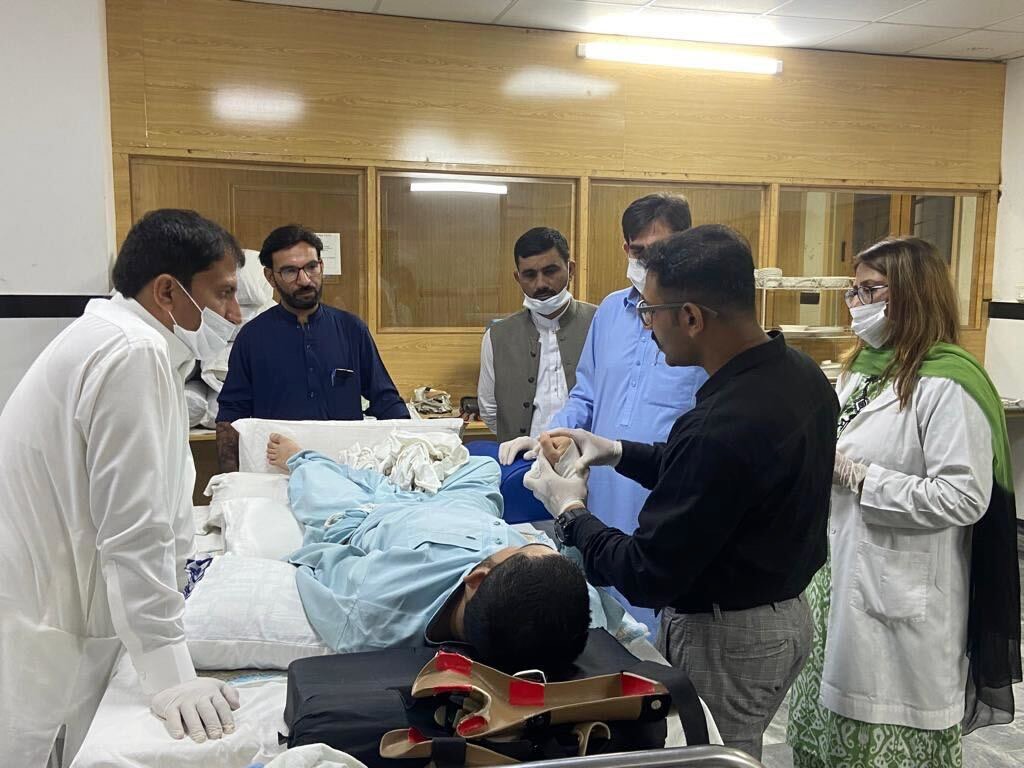
By Martina Lukin for ReLAB-HS
Interdisciplinary practice in physical rehabilitation is still an evolving concept in Pakistan. Rehabilitation professionals, particularly from different provinces, rarely have an opportunity to work together, let alone discuss challenges and compare management approaches. ReLAB-HS delivered a clinical skills training program in Pakistan, a three-month, comprehensive training program covering all aspects of spinal cord injury (SCI) management. Designed to bypass the barriers typically faced by interdisciplinary education and collaboration, the program successfully brought together 14 rehabilitation professionals from diverse backgrounds—occupational therapy, physical therapy, speech and language therapy, prosthetics and orthotics, and clinical psychology—through a range of different mediums.
“Thank you, I really appreciate the efforts and dedication of the facilitators [and] ReLAB-HS for organising such an impactful course.” – Clinical training program participant
Participants completed weekly online Plus courses and participated in online discussion forums. They were also engaged through regular mentoring sessions, led by both local and international mentors, which aimed to consolidate and contextualize the content covered in the online coursework. Most importantly, the program included a three-day, in-person training, offering a rare opportunity for participants to meet face-to-face and practice their skills together with real patients.
This training was not only the first of its kind delivered as part of the ReLAB-HS activities in Pakistan; according to Ilyas Syed, CEO of Paraplegic Centre Peshawar (PCP) where the in-person training was hosted, it was also the first time a training like this has been implemented “in the history of Pakistan.”
“The facilitators find it a very interactive and motivated model of training continued professional education or clinical skills since it is the very first time that interprofessional learning and teaching are both involved.” – Trainer, PCP
PCP is the largest and only center of its kind in Pakistan that focuses exclusively on the rehabilitation of SCI patients. Attending the in-person training at PCP allowed the participants to learn from the highly skilled and experienced team of rehabilitation professionals at the center, as well as have access to and learn about various types of assistive technology, some of which are produced at the center.
“It was an excellent experience not only for the participants, it was also essential for the PCP team, to test their skills and enhance their capacity.” – Ilyas Syed, CEO of Paraplegic Centre Peshawar
Each of the five trainers from PCP that supported the in-person training expressed their gratitude for the opportunity to be involved, which was not only beneficial to the participants but also a valuable learning experience for the trainers themselves.
This is just one of several more clinical skills training programs planned in the final years of ReLAB-HS activities in Pakistan. These training programs to develop clinical skills are part of a long-term plan to empower rehabilitation professionals in Pakistan to become mentors and trainers in their workplace and communities alike.
Having established a strong relationship with PCP and other education providers in Pakistan including Ziauddin University, future training programs will continue to bring together groups of rehabilitation professionals from diverse backgrounds and provinces in Pakistan. Future training will focus on clinical skills alongside teaching skills and mentoring with the guidance of experienced local and international educators and rehabilitation professionals.
“I would like to express my sincere gratitude to team PCP and ReLAB-HS for conducting the training session. It was really helpful and informative. I learnt a lot from it. Once again, thank you very much for your effort and selecting us, will learn more in future too.” – Shazia Haider, occupational therapist, Department of Empowerment of Persons with Disabilities